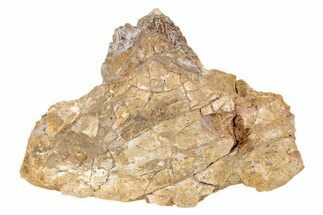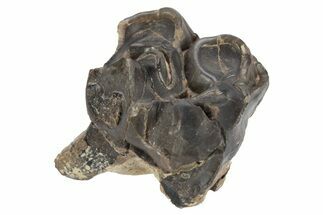This Specimen has been sold.
3.85" Fossil Primitive Whale (Pappocetus) Molar in Situ - Morocco
This is a 3.85" long tooth (molar) from Pappocetus lugardi, a type of protocetid cetacean (early whale ancestor). It is still positioned within the rock it was found in. These rare teeth come from the Middle Eocene-age Aridal Formation, located in the Western Sahara near Gueran, Morocco.
There are glue stabilized cracks through the crown. Otherwise, this tooth is in excellent condition.
It comes with an acrylic display stand.
There are glue stabilized cracks through the crown. Otherwise, this tooth is in excellent condition.
It comes with an acrylic display stand.
About Pappocetus
Pappocetus is a genus of extinct protocetid cetacean. Protocetids are considered to be one of the earliest examples of whale development during the time they were transitioning from land to sea. Fossil records indicate that they are Middle Eocene in age, existing after Pakicetus (earliest known whale) and prior to Zygorhiza (basilosaurid). These protocetids had become much more whale-like in appearance, featuring a more streamlined body with paddle-like forelegs, and hind-limbs that were greatly reduced in size. Their robust teeth and root structures suggest that they were aquatic carnivores, relying on smell and vision as their most important senses for hunting prey. It's unlikely that by this point they had developed echolocation systems used by modern whales.
Pappocetus is a genus of extinct protocetid cetacean. Protocetids are considered to be one of the earliest examples of whale development during the time they were transitioning from land to sea. Fossil records indicate that they are Middle Eocene in age, existing after Pakicetus (earliest known whale) and prior to Zygorhiza (basilosaurid). These protocetids had become much more whale-like in appearance, featuring a more streamlined body with paddle-like forelegs, and hind-limbs that were greatly reduced in size. Their robust teeth and root structures suggest that they were aquatic carnivores, relying on smell and vision as their most important senses for hunting prey. It's unlikely that by this point they had developed echolocation systems used by modern whales.
SPECIES
Pappocetus lugardi
LOCATION
Gueran, Boujdour, Western Sahara, Morocco
FORMATION
Aridal Formation
SIZE
Tooth: 3.85 x 2.3", Entire Specimen: 5 x 3.6"
CATEGORY
SUB CATEGORY
ITEM
#238074
We guarantee the authenticity of all of our specimens.
 Reviews
Reviews












